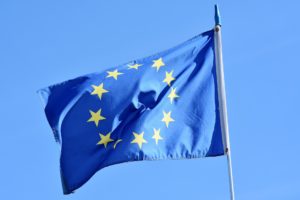Highlights from the Past Week
CW 22 / Tuesday, 30 May to Thursday, 1 June: Mini Plenary Session Week (Brussels);
ARTIFICIAL INTELLIGENCE I – AI ACT VOLUNTARY PACT: EU Commissioner T. Breton has agreed with Google CEO S. Pichai to “work together with all major European and non-European AI actors” to develop a voluntary “AI Pact”, even before the AI Act comes into force (Twitter). He stresses that there is no time to lose in building a safe online environment for AI. Even if the AI Act is passed this year, it will come into force “at the end of 2025 at the earliest”, says Breton. However, given that the AI-based chatbot ChatGPT launched last autumn has gained massive momentum, this topic has become of the utmost importance.
In addition, the EU and the USA announced at the Trade and Technology Council (TTC) that, independently of the “AI Pact”, they will commit to a voluntary code of conduct for artificial intelligence (see Joint Statement). A corresponding draft should be available “in the coming weeks”, said Commission Vice-President M. Vestager at the press conference. (see Contexte, paywall, FR)
ARTIFICIAL INTELLIGENCE II – ONE MAIN GOAL OF THE NEXT COUNCIL PRESIDENCY: In an internal document, Madrid has outlined its own priorities for the Council Presidency in the second half of 2023. These are to be presented at the Telecom Council on 2 June.
Madrid says it will do its utmost in the AI Act negotiations and ensure that it does not jeopardise innovation and that it will protect fundamental rights. The incoming Presidency, which will hold an informal ministerial meeting in León on 23-24 October, also calls for serious consideration of “a new regulatory policy for electronic communications”. Spain also addresses the issue of the contribution of platforms to the financing of telecommunications networks. “This policy should promote the strategic nature of this sector, maintain its dynamism, its strong competitive character and innovation, while at the same time ensuring technical and financial sustainability as well as the fulfilment of the objectives of the Digital Decade”, the document states. The text also encourages the growth of tech and deep tech start-ups. (see Contexte, paywall, FR)
COMBATTING CHILD ABUSE – OVER 1,600 AMENDMENTS TO PARLIAMENT’S DRAFT REPORT: MEPs in the Committee on Civil Liberties (LIBE) had time until 17 May to submit amendments to the draft report by Javier Zarzalejos (PPE). It’s now clear that the MEPs have extensively availed of this option: In addition to the 276 proposals of the rapporteur, 1,633 of his colleagues submitted amendments (PDF).
The first meeting of the shadow rapporteurs on the basis of these proposals was scheduled for 1 June. (see Contexte, paywall, FR)
PRIVACY I – EPRIVACY PRESENTATION IN THE COUNCIL: During the Council meeting last week, Telecom Ministers received a short presentation from the Swedish Presidency on the status of the ePrivacy proposal (video).
The Presidency outlined the agenda of the last trilogue round, focusing on Article 8 on protection of information related to the end users terminal equipment. In this regard, the Presidency confirmed progress on defining specific rounds which would allow collection of information from the terminal equipment of end users.
The Netherlands expressed their concern over potential difficulty regarding the price of obtaining and refusing consent for tracking cookies and suggested that the work should be done outside of the ePrivacy framework. The Minister also highlighted the importance of ensuring that users will not be faced with banners when accessing websites. Moreover, the Netherlands argued that refusing consent should be equally as easy as providing it. The Minister welcomed the initiative of Commissioner Reynders to find voluntary options to refuse cookies and to find suitable alternatives to tracking-based advertising.
France supported the general approach reached in Council, which contained provisions ensuring that defence and national security would be excluded from the scope of the measure. (see EU Issue Tracker, paywall)
PRIVACY II – GERMAN FEDERAL GOVERNMENT OPTIMISTIC REGARDING TADPF: In the Digital Committee of the German Bundestag, representatives of the German Federal Ministry of the Interior (BMI) recently gave a briefing on the planned Trans-Atlantic Data Privacy Framework (TADPF), which aims to create a new legal basis for data transfers from the EU to the US. The BMI is optimistic that the new agreement can be upheld before the European Court of Justice (ECJ).
“Our optimism is based on our interest in legal security certainty for companies”, said Eva-Lotta Gutjahr, the responsible department head at the BMI. Compared to the previous agreements, which were overturned by the ECJ, there have been “significant improvements”. For example, there are binding limits on data access by intelligence services and a two-stage appeal procedure for EU citizens. However, a final assessment of the adequacy decision would only be made once the Commission has presented a revised version.
One of the critical voices came from J. Zimmermann (SPD). He said that there were too many exceptions to the access rights for intelligence services, so that any monitoring measures could ultimately be justified. The Greens also have doubts about the stability of the agreement: “The new adequacy decision is on shaky ground and will be revisited at the latest with a Trump-style government”, their representative in the digital committee, T. Bacherle, told Tagesspiegel Background. (see Tagesspiegel Background, paywall – DE)
ONLINE POLITICAL ADVERTISING – FRANCE WANTS TO “DEFEND THE COUNCIL’S MANDATE”: “The European Parliament’s proposals, which heavily restrict the use of targeting techniques […] limit the valuable balance between […] access for all citizens to political information, in particular through the activities of political parties, and the protection of citizens’ ability to exercise their freedom in an informed manner and without interference”, says France in its comments of 12 May. The 23 May document contains the comments of several states in the context of trilogues with the Parliament on the regulation on political advertising.
Germany, on the other hand, considers that “this regulation can only be effective if it does not fall behind the prohibition of the DSA on advertising using special categories of personal data”. This is considered to be the risk posed by one of the three ways the Commission is trying to break the impasse in negotiations on targeted advertising. In contrast, Ireland “does not favour additional restrictions on targeting which amounts to a complete ban”. Negotiators still hope to reach an agreement in June – although some points are still rather tricky. (see Contexte, paywall, FR)
DATA ACT – WORK CONTINUES: At the Telecommunications Ministers’ meeting, there was a brief presentation by the Swedish Council Presidency regarding the status of work on the Data Act proposal (video).
The aim of the proposal is to increase access to data generated by products and related services for all actors. Moreover, the proposal would facilitate switching between providers of data processing services and appropriate safeguards against unlawful international data transfers.
On 23 May, the second round of trilogue discussions took place. The discussions focused on EU institutions in scope, inclusion of macro and small enterprises, potential merger of prevention and recovery from a public emergency, and potential inclusion of personal data in the scope of Article 5.
The Chair assured the Member State Ministers that the negotiators are committed to achieving a satisfactory compromise. Next, the Chair announced that the negotiators will aim to achieve a compromise during the next trilogue meeting, scheduled for 27 June 2023. (see EU Issue Tracker, paywall)
CYBERSECURITY – COUNCIL SEES FURTHER NEED FOR AMENDMENTS: At the Telecommunications Council last week, EU ministers raised several points that require further deliberation in the Cyber Resilience Act (CRA); namely, certification schemes, reporting obligations, the exclusion clause and open software.
While Dutch State Secretary Alexandra van Huffelen expressed openness to the use of certification schemes (not mentioning EUCS) in relation to highly critical products, she stressed that “certification schemes should in any case exist in the first place” (video).
INFRASTRUCTURE – COUNCIL DISCUSSES GIGABIT INFRASTRUCTURE ACT: The Gigabit Infrastructure Act (GIA) was also on the table of the Telecommunications Council last week.
Several countries such as the Netherlands, Finland, Romania, Latvia and Croatia called for the dossier to be taken into account in national circumstances, involving factors such as different authorisation procedures. Italy also called for an avoidance of excessive administrative burdens, while some smaller countries requested a longer transitional period (video).
EDPB – NEW CHAIR FROM FINLAND: The Finnish Data Protection Supervisor Anu Talus has taken over the leadership of the European network of national authorities, the European Data Protection Board (EDPB).
Talus won the race in a second round of voting versus Dutch data protection commissioner Aleid Wolfsen. Wolfsen remains as deputy chair, while Cypriot chief regulator Irene Loizidou Nikolaidou was elected as a second deputy chair. (see EDPB press release)
BEREC – NEW ROAMING DATABASE PUBLISHED: In line with the Roaming Regulation, from 1 June 2023 mobile operators have to provide to roaming customers when travelling in the European Economic Area (EEA) information about means of access to emergency services and numbering ranges for value-added services in a user-friendly way. For this purpose, operators are asked to consult the BEREC’s roaming databases on value added services, emergency services and public warning systems. (see BEREC press release)
USA – PUBLICATION OF FACTSHEET ON ARTIFICIAL INTELLIGENCE: The US government has announced a series of new actions to further promote a regulatory framework for the responsible use of AI technology. These steps involve research and development, public participation in priority setting, and AI use in education.
In order to engage the public more intensively, a further public consultation on the national AI strategy has also been launched. This is to help identify where the national priorities are “for mitigating AI risks, protecting individuals’ rights and safety, and harnessing AI to improve lives”, according to the White House factsheet.
Relevant Publications, including from the EP Think Tank:
- Implementation of the 2018 Geo-blocking Regulation in the Digital Single Market (In-Depth Analysis)
A Selection of the EU Commission’s Consultations
- Extension of the date of applicability of the RED delegated act on cybersecurity, privacy and protection from fraud – Feedback on the delegated regulation: 24 May to 21 June 2023
- Cyber Solidarity Act – Feedback on the regulation: 20 April 2023 to 20 July 2023 (extended)
- Net Zero Industry Act – Feedback on the regulation: 20 March to 27 June 2023
- European Critical Raw Materials Act – Feedback on the regulation: 20 March 2023 to 30 June 2023
Outlook for the Current Week
You can find a list of the upcoming dates of the European Parliament here. The meeting calendar for 2023 is available here (PDF).
An overview of the most important dates of the Council week can be found here and the meeting calendar can be accessed here.
The official calendar as well as the programme of the Swedish Presidency can be found on the associated website.
Included among the Council dates are:
Summits and Ministerial Meetings:
- Justice and Home Affairs Council (incl. EMFA), Thursday, 8 and Friday, 9 June – Agenda, A Items;
- Informal Meeting of Agriculture and Fisheries Ministers, Sunday, 11 to Tuesday, 13 June – Programme;
Preparatory Bodies:
- Working Party on Competitiveness and Growth (Industry), Monday, 5 and Tuesday, 6 June (Agenda), Thursday, 8 June (Agenda);
- Working Party on Cooperation in Criminal Matters (COPEN) ( E-Evidence), Monday, 5 June (Agenda);
- Working Party on Hybrid Threats, Tuesday, 6 June;
- Horizontal Working Party on Cyber Issues, Wednesday, 7 June and Friday, 9 June;
- Working Party on Tax Questions (Direct Taxation), Thursday, 8 June (Agenda);
- COREPER I, Wednesday, 7 and Friday, 9 June (Agenda);
- COREPER II ( CSA), Monday, 5 June (Agenda) and Wednesday, 7 June (Agenda);
Information about the weekly Commission meeting can be found on the website of the Commission in the preview (PDF) or (at short notice) in the current agenda. The non-legislative proposal on the metaverse has been postponed to 11 July. Meanwhile, the directive on tackling child abuse, the draft of which had been scheduled for 6 September, has now once again been removed from the preview.
The following topics are on the agenda for the coming week:
- A New Agenda for Latin America and the Caribbean
- Inter-institutional ethics body
- Defence of democracy package
- A comprehensive approach to mental health
The judicial calendar of the ECJ can be found here. On Thursday, the Advocate General will deliver his opinion in the Google et al. case on questions concerning the Austrian Communications Platforms Act (KoPl-G) (C-376/22).
European Parliament Committees
CW 23 / Monday, 5 to Thursday, 8 June: Political Group and Committee Meetings Week (Brussels);
LIBE Committee (Civil Liberties)
Current Meetings
- Monday, 5 June 14.30-18.00 (Brussels)
Excerpt from the Draft Agenda
The current agenda does not contain any topics of direct relevance to the Internet industry.
Further Meetings (Calendar)
- Wednesday, 28 June 2023, 9.00-12.30 and 14.30-18.00 (Brussels)
- Thursday, 29 June 2023, 9.00-12.30 (Brussels)
JURI Committee (Legal Affairs)
Current Meetings
- None
Further Meetings (Calendar)
- Monday, 26 and Tuesday, 27 June (Brussels)
Dossiers Timetable (15 May 2023)
ITRE Committee (Industry)
Current Meetings
- None
Further Meetings (Calendar)
- Monday, 12 June (Strasbourg)
- Wednesday, 28 June, 9.00-12.30 and 14.30-18.30 (Brussels)
- Thursday, 29 June, 9.00-12.30 (Brussels)
Dossiers Timetable (PDF) (30 May 2023)
IMCO Committee (Internal Market)
Current Meetings
- None
Further Meetings (Calendar)
- Wednesday, 28 June, 9.00-12.30 and 14.30-18.30 (Brussels)
- Thursday, 29 June, 9.00-12.30 (Brussels)
Dossiers Timetable (May 2023)
CULT Committee (Culture)
Current Meetings
- None
Further Meetings (Calendar)
- 28/29 June (Brussels)
INGE2 Committee (Special Committee on Foreign Interference)
Current Meetings
- None
Further Meetings (Calendar)
- Open
Further Parliamentary Calendar Dates
- CW 24 / Monday, 12 to Thursday, 15 June: Plenary Sessions Week (Strasbourg);
- CW 25 / Monday, 5 to Thursday, 8 June: Mini-Plenary Sessions Week (Brussels);
- CW 26 / Monday, 26 to Thursday, 29 June: Committee Meetings Week (Brussels);




